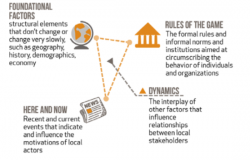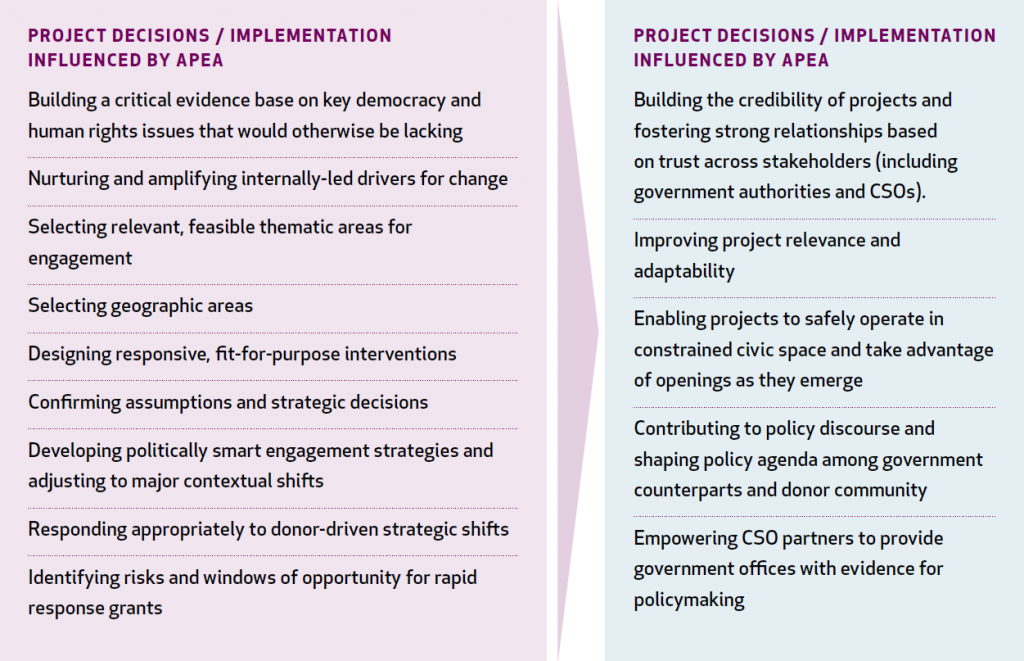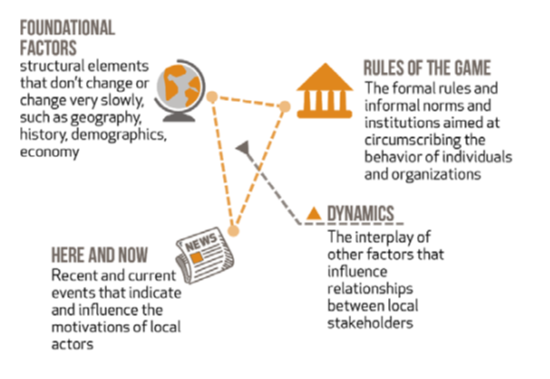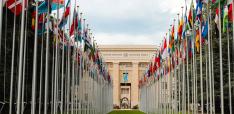What does politically smart support to democracy and human rights look like?

This blog is published to coincide with a webinar on “Making a difference: How Applied Political Economy Analysis contributes to impact through better informed decisions” on Wednesday 24 May. It shares the findings of a Learning Review on the use of PEA in three USAID-funded human rights projects under the Human Rights Support Mechanism, which is led by Freedom House with the American Bar Association Rule of Law Initiative and Pact as core consortium partners.
Political economy analysis (PEA) has become more common in the design and implementation of development programmes. But is it just another donor tick-box exercise, or does it add value?
In a nutshell, PEA can help projects avoid messing things up and navigate political barriers and opportunities as they seek to reach their objectives.
This finding emerges strongly from a learning review commissioned by Pact on three projects of the USAID-funded Human Rights Support Mechanism, in Colombia, Somalia and Tanzania. The review suggests that PEA can make a considerable difference in practice.
Each project was designed to undertake PEAs systematically (at a minimum during the inception phase and then annually). The learning review traced how the projects have used PEA insights in their decision-making, and whether and how these decisions have contributed to project implementation and achievements.
PEAs can sharpen decisions and reduce risks
PEAs have influenced both strategic and operational decisions. In Tanzania, during the constrained political context under President Magufuli’s rule, the Data Driven Advocacy (DDA) project used PEAs to identify ‘go’ and ‘no go’ areas. It was possible for a donor-funded project to support civil society organizations (CSOs) but the PEA concluded that some topics, such as freedom of expression or LGBTI+ rights, were simply too risky. As a result, DDA ‘went with the grain’ and picked less sensitive but nonetheless important issues where it was possible to make progress, such as gender-based violence or youth engagement. By ensuring that CSOs understood and complied with restrictive regulations, DDA helped them be less targeted by administrative harassment and gain the space to operate – whether by proving they had been invited to contribute to parliamentary consultations or simply by avoiding controversial terms, preferring the short-hand ‘rights’ instead of the more controversial ‘human rights.’ As the political context improved under President Hassan, DDA was able to address more sensitive issues, such as the reform of the political parties and media services acts.

But only if management back them
PEAs are more likely to have influence when management is committed to evidence-based decision making and makes space for PEA insights to be discussed. In all three projects, in-depth or targeted PEAs were valued for generating new data and evidence. Through the use of PEA and other forms of analysis, Conectando Caminos por los Derechos (CCD) in Colombia was able to design and implement interventions that are highly responsive to conditions on the ground. Ongoing PEA enabled the project to respond to an unexpected government decree regularizing the status of migrants. This policy change opened an important window of opportunity to promote the human rights of Venezuelan migrants, but it also threw up challenges about how the policy would be implemented. PEA helped CCD to identify these challenges and how to support migrants to make use of the new policy.
PEAs can win friends and influence donors
The influence of PEAs can go beyond project-level decision-making. The Somalia Expanding Access to Justice (EAJ) project produced high quality research studies, such as on the role of sharia law, which were valued across the donor community, in a context where it is difficult to gather first-hand data, given widespread insecurity and distrust of foreigners. These reports filled the knowledge gap on how disputes are resolved in practice in a context of legal pluralism, from the weaknesses of the formal justice system to the strengths of community-based paralegals. They added value by explaining who benefited from these various mechanisms, who might seek to manipulate them, and how access could be expanded without generating new risks.
And contribute to some big policy wins
Do these political economy-based decisions, on what issues to engage in, where, and with whom, help make projects more effective? Our review was not an evaluation, and we did not investigate all contributing factors. Nonetheless, for a number of project achievements, our analysis made it clear that PEA-informed decisions were a critical success factor. For example, CCD influenced Colombia’s public policy agenda on migration from Venezuela. The PEA emphasised the need to shift from a purely humanitarian approach to the crisis towards a longer-term human-rights based response that focuses on improving citizen security and social cohesion.

PEA needs to be embraced as a lens rather than as a (one-off) product
We found that, more than individual PEA-informed decisions, it is the incorporation of political economy as a lens or mindset into project ways of working that contributes the most to project effectiveness. This is how projects jump from ‘thinking’ to ‘working’ in politically aware ways. DDA in Tanzania made regular adjustments in response to its quarterly analysis, which investigated which new partners to bring on board and how to engage with government bodies. The PEAs were undertaken by project staff, not consultants; findings were discussed with all team members, as well with the project’s advisory committee and USAID, generating a common understanding of how the project was operating. EAJ in Somalia drew on local political economy experts, able to answer specific operational questions in a timely manner about who may benefit from an intervention and which patronage networks might be reinforced. But potential security risks associated with such insights in Somalia have meant that the information was not shared widely, and there was less widespread ownership of the analysis.
And there are simple lessons for not messing things up
The lessons for other initiatives wishing to operate in this way are not radically new, but reinforce broader insights in the field (such as in this new FCDO/TWP community of practice guidance). Management commitment to PEAis essential, including in terms of incorporating analysis as an ongoing lens in the project cycle; resourcing PEA through dedicated project positions or consultants; making time for research and analysis; using the analysis to inform programmatic decisions and implementation; and being open to challenges. A more hierarchical or fragmented team culture seems to lead to PEA processes that are less inclusive and/or that can undermine the extent to which insights from PEAs inform decisions. More regular and/or lighter-touch PEAs make it possible to identify changes in context, opportunities, and constraints on a more regular basis, and to inform decision-making accordingly, for example through rapid response mechanisms grants.
However, PEAs are far from a magic bullet. Analysis on its own is not sufficient to ensure that projects are adequately suited to context and that they ‘don’t mess things up’. Ultimately, it is the funder who decides what a project should work on, why, where and with whom; and funders rarely make these strategic decisions on the basis of PEA alone, and always in light of other priorities. In Somalia, for example, it is our view that the influence of high-quality PEAs under EAJ was limited because key programmatic shifts were driven primarily by strategic pivots in US government policy, rather than by project analysis. It is much more difficult for project-level PEAs to influence such geo-political decisions, highlighting yet again why the political economy of donors matters.
Laure-Hélène Piron is a Director of The Policy Practice with 25 years of experience in international development policy and management with expertise in: political economy analysis, thinking and working politically, political development, access to justice and rule of law, human rights, conflict and fragility and institutional development. She has a track record in policy and strategy development, as well as in the design, review and evaluation of programmes. She has managed numerous multi-national and multi-disciplinary teams and has undertaken assignments for bilateral and multilateral agencies as well as international NGOs in Africa, Asia, the Middle East, Balkans and Latin America. She's a core trainer in our Political Economy in Action course and facilitates political economy and adaptive management processes.
Originally from Mexico, Alina Rocha Menocal has had a long career at ODI. She joined ODI in 2005, and was one of the founding members of what is now the Politics and Governance Programme. At ODI, Alina was a Principal Research Fellow in Politics and Governance until June 2021, and remains a Senior Research Associate. She is currently the Director of the Thinking and Working Politically Community of Practice (TWP CoP) hosted at the University of Birmingham, where she is also a senior Research Fellow, and a Principal at The Policy Practice.
Kate Byom is a manager on Pact’s Governance team, where she provides technical leadership to a global portfolio of civil society strengthening, local governance, and peacebuilding programs. She has nine years of experience designing, advising, and implementing democracy, rights, and governance programs, with a focus on human rights. In her current role, she supports Pact’s DRG programs in Myanmar, Cambodia, Ethiopia, and Tanzania, including by designing and executing Applied Political Economy Analysis (APEA) studies and research. She also led a global learning review of Pact’s APEA practice and spearheaded efforts to operationalize the recommendations. Prior to joining Pact, she managed Freedom House’s East Africa portfolio, with a focus on programs in Kenya, Tanzania, and Uganda. She holds an MA in human rights from University College London.
This first appeared on From Poverty to Power.


